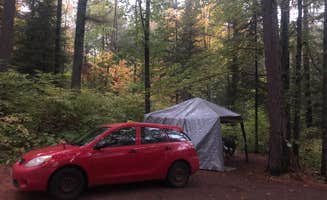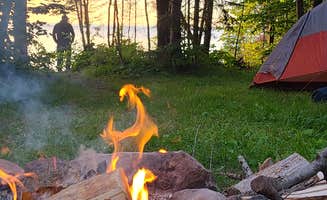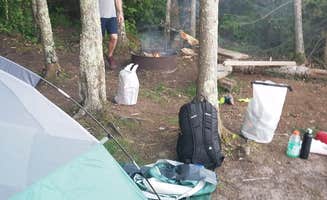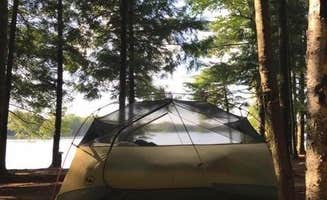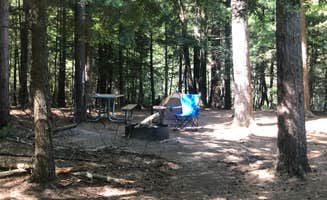Tent camping near Marengo, Wisconsin places visitors within the Lake Superior watershed, where glacial terrain has created a landscape of mixed forest, wetlands, and waterways. The area averages 52 inches of annual snowfall, with summer temperatures typically reaching 75-80°F during peak camping months. Winter camping is limited at most locations due to seasonal closures and access challenges.
What to do
Hiking trails: At Stockton Island, one reviewer noted, "Lots of hiking, kayaking, nature watching and more, even swimming if you can brave the cold Superior temps." The island offers several miles of trails through diverse ecosystems.
Trout fishing: Big Rock Campground sits "right on a beautiful trout stream" according to one camper, making it ideal for anglers. The nearby streams are known for brook and brown trout during spring and fall seasons.
Paddle routes: The waterways of the Turtle Flambeau Scenic Waters Area create extensive paddling opportunities. A camper mentioned, "Take a canoe down the Turtle Flambeu Flowage and you will be surprised at how many campsites are available but also you will notice most times it's like having an Island to yourself."
Wildlife observation: Many campgrounds offer excellent wildlife viewing. One visitor to Turtle Flambeau noted, "Wildlife is abundant with Bald Eagles, Loons, deer, coyotes, and sounds of wolves."
What campers like
Island privacy: Campers consistently mention the seclusion of island sites. At Sand Island, a reviewer stated, "The sites are very secluded from one another so you hardly run into people."
Natural beaches: Several campsites offer water access including natural beaches. One camper at Point Detour Wilderness Campground mentioned, "Our site had a short trail directly to Lake Superior."
Rustic facilities: The primitive nature appeals to many tent campers. A visitor to Phipps Landing appreciated the simplicity: "3 established tent sites, 1 is more secluded than the others. Pit toilets."
Free firewood: Some campgrounds provide unexpected amenities. A camper at Point Detour Wilderness was pleasantly surprised: "Fun fact: free firewood! Or at least there was a large pile of it when we were there. Free for the taking, so that was a nice surprise."
What you should know
Reservation systems vary: Some campgrounds require advance planning. For Point Detour Wilderness Campground, "The reservation set up is a bit odd since you have to make it with the casino/hotel front desk and check in there, but the campground is about 9 miles away."
Bring water filters: Many remote sites lack potable water. A Phipps Landing camper advised, "Bring your own water or filtration. No rubbish bins."
Weather precautions: Lake Superior creates unpredictable conditions. A Stockton Island camper noted, "The season is short, from late June to Labor Day; traversing the lake is too unpredictable after that!"
Water transportation requirements: Many premier sites require boats. One Sand Island visitor cautioned, "It's important to have a sea kayak or a motorized boat. If using a kayak make sure you have a wet suit! The water can be difficult and cold."
Tips for camping with families
Group sites available: Some campgrounds offer dedicated group areas. At Oak Island, "Site-A is where it's at for group camping (8-24 people)."
Bug protection essential: Insects can be intense during certain seasons. An Oak Island visitor recommended, "Bring head nets and long clothes June-July for bugs."
Consider site location carefully: Some sites offer more family-friendly features. At Big Rock Campground, sites are "wooded and spacious" but a visitor noted they can be "a bit weary from use."
Pack for extended stays: With limited access to supplies, proper planning is essential. A Stockton Island camper advised, "Be prepared with all the supplies you need for your stay as the water shuttle only comes to the island a few days a week."
Tips from RVers
Limited RV options: Most campgrounds in the area are tent-focused with minimal RV amenities. At Point Detour, some sites can accommodate small RVs, but one camper noted "all were very unique, no two were the same. Some very small for a tiny tent and privacy and a few others more open."
Consider access limitations: Many campgrounds have restricted vehicle access. A Phipps Landing visitor mentioned, "You can drive in and park at this site, or canoe down the Namekagagen and pull up."
Plan for primitive conditions: RVers should prepare for minimal facilities. At Turtle Flambeau, there are no hookups, and sites are described as having "the bare minimum" with primitive toilet facilities.


